Gardening is not only a popular pastime, but it also offers numerous benefits for elderly individuals. Engaging in gardening boosts self-assurance and promotes mental well-being through the sense of purpose and accomplishment it provides.
An English poet, Alfred Austin, said, “To nurture a garden is to feed not just the body, but the soul.” Well, his words correctly align with the situation regarding an older adult.
In old age (60+), people’s activities are more about feeding their souls than their bodies.
As our beloved elderly family members can’t be involved in many activities to help their minds and bodies, gardening can make them achieve both goals simultaneously. Researches and studies also prove that.
That’s why the benefits of gardening for the elderly person are crucial. In this blog, we will delve into the benefits to understand the fundamental worth of it.
The Magic of Gardening: Enhancing the Lives of the Elderly
Gardening is more than just a hobby; it is a therapeutic and fulfilling activity that can greatly benefit the elderly. In this modern era of technology and fast-paced living, gardening offers a timeless and enriching experience that can positively impact physical, mental, and emotional well-being.
We explore the numerous benefits that gardening brings to the lives of our beloved seniors.
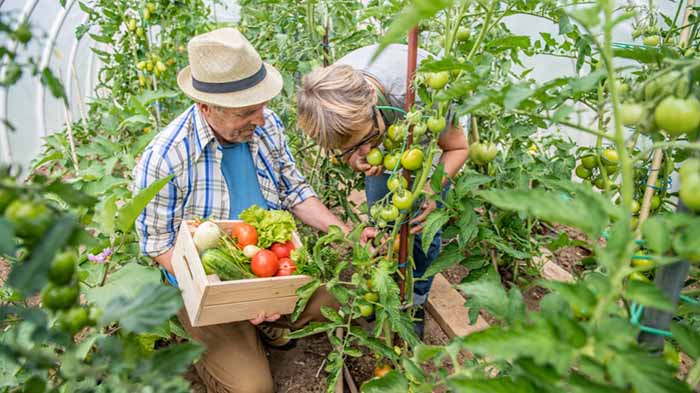
Why Gardening is an essential activity for the elderly?
Gardening is essential for the elderly as it provides physical activity, mental stimulation, a sense of purpose, social interaction, mood enhancement, and nutritional benefits. It is a holistic endeavor that promotes overall well-being and quality of life for the elderly population.
Gardening is essential for older people for several reasons:
- Physical activity: Gardening involves various physical activities such as digging, planting, and weeding, which help the elderly stay active and improve their strength, flexibility, and coordination.
- Mental stimulation: Gardening provides a stimulating environment for the elderly, helping them stay mentally engaged and reducing the risk of cognitive decline. It requires problem-solving skills, memory recall, and attention to detail.
- Sense of purpose: Gardening gives the elderly a sense of purpose as they care for plants and watch them grow. It provides a daily routine and something to look forward to, which can contribute to their overall well-being.
- Social interaction: Participating in gardening allows the elderly to establish connections with like-minded individuals, transforming it into a social endeavor. Whether they opt for community gardens or join gardening clubs, They can engage in social interactions that alleviate feelings of loneliness or isolation.
- Mood enhancement: Being in nature and working with plants has been shown to impact mental health positively. Gardening can reduce stress, anxiety, and depression, improving the overall mood and well-being of the elderly.
- Nutritional benefits: Growing fruits, vegetables, and herbs in a garden allows the elderly to access fresh and nutritious produce. This can contribute to a healthier diet and better overall health.
Benefits of Gardening for the Elderly
Gardening has proven to be a beneficial and enjoyable activity for people of all ages, particularly for the elderly.
Benefits of Gardening for Physical Health
In old age, physical movement becomes limited for certain people, and some can’t maintain regular physical exercise to keep themselves healthy.
On that point, gardening can expose them to low-impact exercises, including digging, planting, weeding, and watering. It means the procedure involves them in multiple motions and movements.
They are light, tiring, and easy to do, yet they serve the purpose of physical exercise for older seniors. This limited exercise significantly impacts their health and improves cardiovascular health, strengthened muscles, and enhanced stamina.
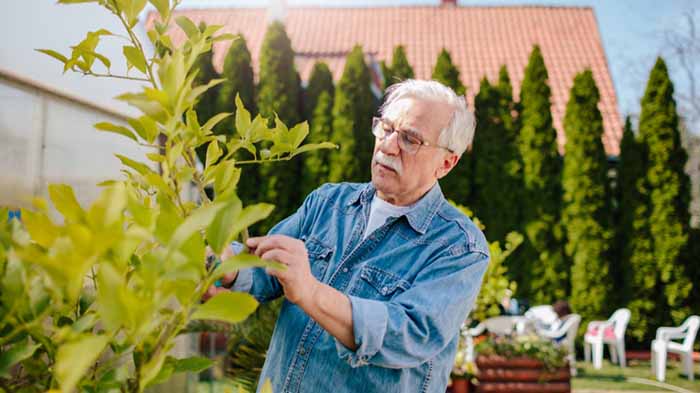
Mental Health Benefits of Gardening
Activities can effectively reduce stress and anxiety by establishing an environment of calmness and peacefulness.
The sight of a garden, the smell of the soil, and activities help an older person to relieve their inner storms.
Sweating activities like digging lets a person express their agitation and frustration. When they put their negative energy into such activity, they only remain with positive energy afterward.
When they see their planted plants growing, it also gives them a mental satisfaction of achievement, and they feel validated. This also makes them feel that their role in the world’s improvement has not ended yet. And they get encouraged to live happier.
Social Benefits of gardening for older people
Social interaction is vital for older adults. But in practicality, it is mainly seen that older retired people do not get much of the attention of other family members and become isolated.
Indeed, everyone can’t give that much time to the family’s oldest member because of their busy schedule.
In this case, gardening clubs or community gardening can help them be socially active and increase interaction. It can also allow them to share their knowledge, tips, dos, and don’ts of gardening in a broader place where they will feel connected.
Cognitive Benefits
We regularly use cognitive abilities to do daily tasks like reading, thinking, remembering, and reasoning. It means it is the primary and most important function of our lives to live.
You must have heard older adults have Dementia, a dysfunction of cognitive abilities.
But did you know studies say the risk of Dementia lowers by 36% for older people who are involved in regular gardening? Yes, gardening stimulates the cognitive abilities of a person.
It requires planning and thinking about what seeds or plants to plant, how to grow, where to plant, what soil is needed, how much watering is required, and so on.
This planning makes a person’s brain actively working to get the job done appropriately. That’s how it lowers the risks of developing cognitive disabilities and increases healthier cognition.
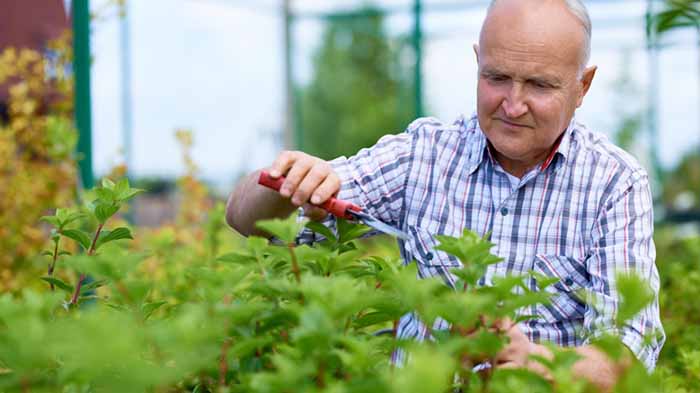
Emotional Benefits
The emotional benefit obtained from gardening is one of the most valuable advantages for senior citizens. Naturally, doing something we like or things with a scope of bringing good results makes us feel good.
We feel joyous because, during the process, our feel-good hormones, such as endorphins and serotonin, are released. These hormones regulate our emotional states and make us feel better.
Gardening for elderly seniors works in the same way. Growing plants or just sowing seeds makes the person feel confident about the results. Besides, it boosts their self-esteem.
The feeling of fulfillment becomes the key to emotional stability and happiness for older people during gardening.
Therapeutic Benefits
In rehabilitation centers, where therapy is the primary objective to help their members, gardening is considered one of the most effective methods. It means gardening and therapy always had a deep connection.
Gardening stimulates the senses with the touch, smell, and sight of various plants and flowers, providing sensory stimulation that can immensely benefit elderly persons.
Besides, nurturing plants can provide comfort during difficult times, contributing to emotional healing and grief support on a bigger scale.
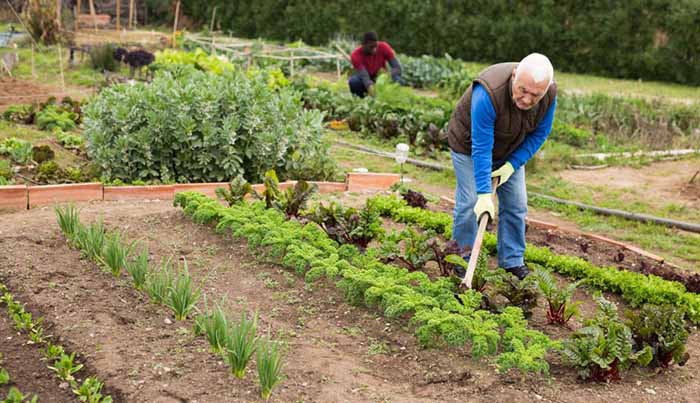
Conclusion
Alongside the benefits mentioned here, gardening has numerous benefits for older people that we can’t measure with our bare eyes. So, engaging our elders in gardening is very important to keep them fit.
Only when they actively participate in gardening will we be able to ensure their good physical, mental, social, emotional, and cognitive health.
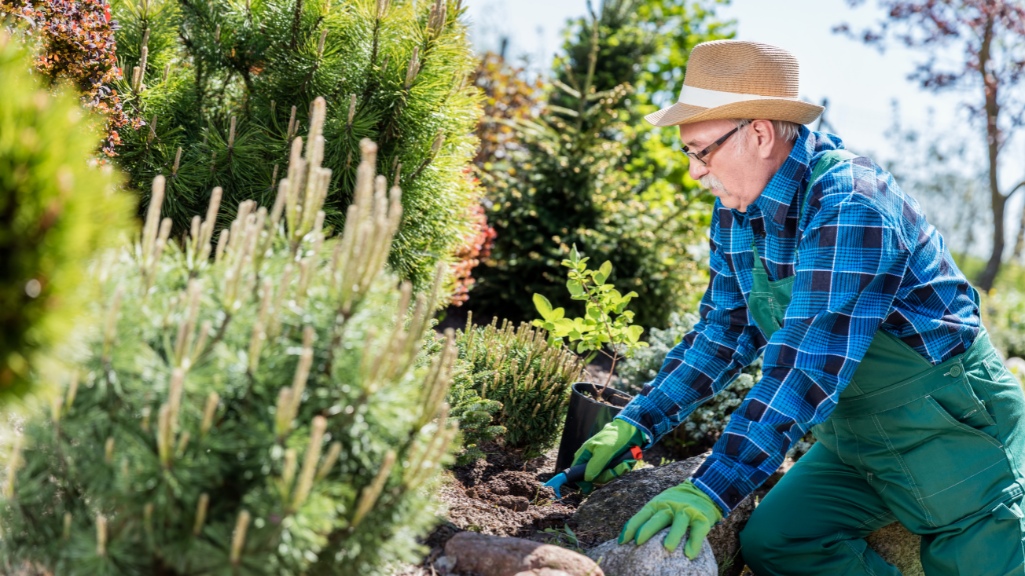
Do this must if you are over 50 years to keep yourself fit and strong. Regular working is a key to be happy in older age